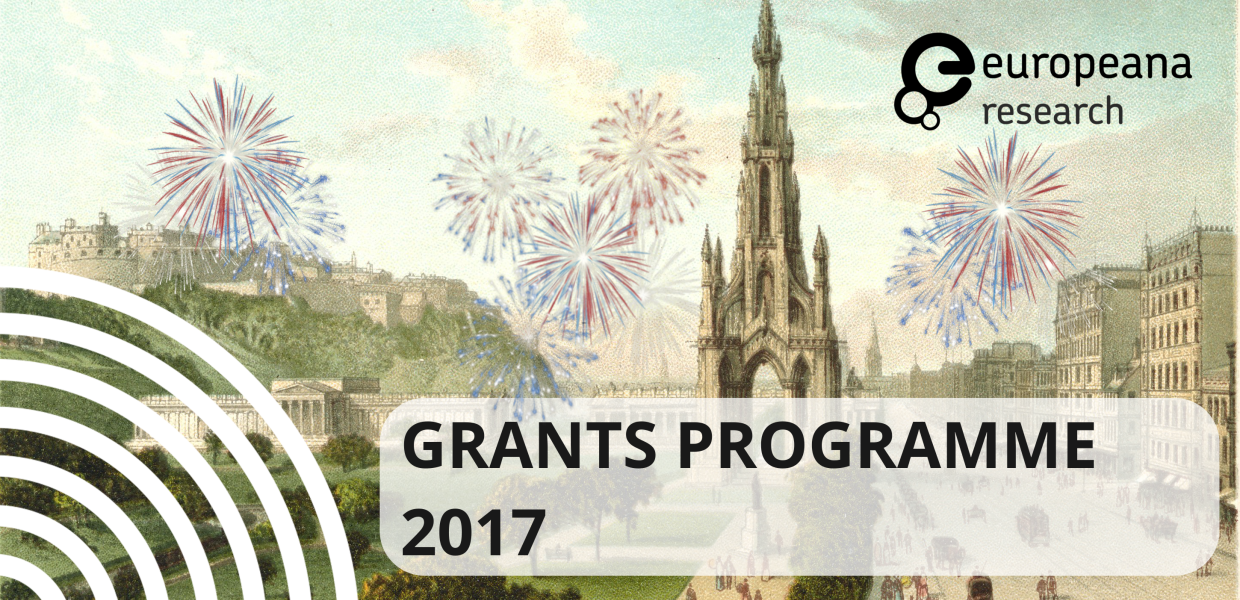Meet the winners of the Europeana Research Grants Programme 2017
We're thrilled to announce our three Grants Winners for the Europeana Research Grants Programme 2017, together with the short list of promising proposals.
On 28 September the Call for Proposals for the second Europeana Research Grants Programme officially opened, and ran until 12 November. This year's Grants Programme invited researchers from all over Europe to send in research proposals connected to the theme of intercultural dialogue. The response was overwhelming, with more than 60 proposals sent in from 21 different countries and 45 different research institutions. Check the visualization below to discover the diversity in this year's applicants!
The grants winners
After four rounds of reviews by the Europeana Research team and the Europeana Research Advisory Board, three proposals were selected for funding from a short list of seven. We are happy to announce and extend our congratulations to Caterina Preda, Krista Murchison, and Margaret Quinn. Here is a quick overview of their proposals:
Caterina Preda - A visual tool for the display of the visual representations of the Roma of Romania in the 19th and 20th centuries in the Europeana collections: between stereotypes and truthfulness
This project provides a web platform, which includes the visual representations of the Roma of the Romanian territories as they appear in the Europeana collection in the nineteenth and twentieth centuries’ depictions. This web-platform will be used as a didactic tool in the classroom, in high school and university level courses. The research investigates the ways in which the stereotypical repetitive representations of the Roma help explain the current underprivileged situation of this community in Europe and in Romania in particular. The project argues for a more balanced and comprehensive understanding of a largely unknown history by using visual representations taken from the archives of the libraries, which are included in the Europeana collections. The web platform uses several categories and by this classification, helps bring forward the visual mechanisms that have helped consolidate the images of the 'romantic', 'exotic', 'other'.
Dr. Caterina Preda is an Assistant Professor at the Faculty of Political Science, University of Bucharest in Romania.
Krista Murchison - A Digital Database of Manuscripts and Intercultural Dialogue in Post-Conquest England
This project will draw on Europeana data to take a new approach to the status of French writing following the Conquest. It will create and analyse an EDM-compliant digital database of all 958 manuscripts containing French literature from medieval England. By providing unprecedented quantitative evidence for the persistence of French among lay and clerical audiences alike in the centuries following the Conquest, this project will contribute to an urgent and growing body of linguistic scholarship (Lusignan 2011; Ingham 2012; Wogan-Browne 2015) and socio-historical studies (Rothwell 1994; Georgianna 1998; Butterfield 2009; Ingham 2010) that has exposed factual and ethical flaws in the 'triumph' of English narrative and highlight medieval England’s multifaceted intercultural dialogue.
Dr. Krista A. Murchison is Lecturer of Medieval English Literature at the Leiden University Centre for the Arts in Society in the Netherlands.
Margaret Quinn - An Intercultural History of Northern Ireland: Mapping Intercultural Exchange and Inter-dependency from 1600 to Modern Day
Through an analysis of resources deriving from the Europeana Collections content, and other historical documentation, this project will construct the intercultural history of Northern Ireland from 1600 to present day. The final outcome of the project will be an interactive, open access website that presents the intercultural historical narrative of Northern Irelands from 1600 to present day. The primary objective of the project is to create an online, easy access learning and development tool which can be utilised by schools, community groups and cultural organisations to facilitate intercultural dialogue, and enable the development of intercultural competencies that can directly impact on the broader intercultural community of Northern Ireland.
Margaret Quinn is a PhD Candidate at Ulster University in Northern Ireland.
The shortlist of promising proposals
In the last round of reviews, the three final projects were selected from a shortlist of seven. These projects are all promising and unique in their own way, and deserve being mentioned for all the effort and time that was put into constructing them. Here are the four proposals that, together with the three grants winners, constitute the shortlist. In no specific order:
Matteo Romanello - Linked Books: Towards a Serendipity Engine for the Humanities and Social Sciences
Néhémie Strupler - Cuneiform radaR
Sofia Alexopoulou - A photography, a thousand words?
Rachele Sprugnoli - Interculturality in Historical Travel Writing: Seeing Italian Culture Through Travellers’ Eyes
Thank you to everyone who sent in a proposal for this year's Grants Programme. The projects of the three funded researchers will start in January 2018, keep an eye on the Europeana Research page to find updates on these projects and for more news on Europeana Research Grants Programmes.


